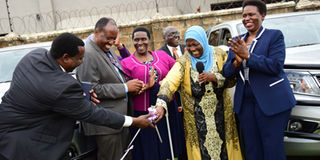UNDP tells government to restructure institutions as NDPIII starts

Handover. Gender, Labour and Social Development minister Janat Mukwaya (2nd right), cuts tape at the official handover of vehicles to the Equal Opportunities Commission (EOC) on Wednesday, in Kampala. The six vehicles were donated to the EOC by the European Union in support of gender, equity planning and budgeting project. The vehicles include four double cabin pick-up trucks, one Toyota TXL Prado and a mini-bus.
PHOTO BY KELVIN ATUHAIRE
What you need to know:
- Reason. The UNDP says such reforms will help Uganda have policy directions and institutions which plan and implement projects effectively.
- The National Planning Authority, in partnership with UNDP, launched five breakfast policy series between July and August 2019.
As the country shifts to National Development Plan III, the United Nations Development Programme (UNDP) has advised the government to carry out urgent policy and institutional reforms for Uganda to realise its development agenda.
The UNDP, a global network agency on human development, explained that such reforms will help the country have policy directions and institutions which plan and implement projects effectively.
The UNDP counsel, however, came after government shelved its plan to merge or revert some agencies to parent ministries, which was drummed up about a year ago. It is not clear why government abandoned this plan.
But as NDPII comes to an end, UNDP has called for restructuring of government bodies in order to streamline service delivery and inform the formulation of NDPIII.
The National Planning Authority, in partnership with UNDP, launched five breakfast policy series between July and August 2019.
The series are aimed at identifying high impact strategies reforms or interventions for considerations in NDPIII and the associated programmes and identifying appropriate financing options.
Speaking during the fifth breakfast meeting on Thursday in Kampala, the UN resident coordinator, Mr El-Khidir Daloum, said: “There is need for policy and institutional reforms to create an enabling environment for effective resource mobilisation and investments. The reforms should include, among others, revisiting incentives while ensuring accountability.”
Mr Daloum said such fiscal reforms should be equitable in nature and benefit those who are at risk of getting “left behind.”
“Development financing needs to be broaden to include increased domestic financing, and innovative financing sources and mechanisms. This is particularly important in the context of dwindling Official Development Assistance (ODA); and effective utilisation of resources and accountability is equally key,” Mr Daloum said.
“We need to strengthen systems to guarantee value for money, and we need to rationalise the use of existing financial resources so that we can fully optimise such resources.”
The UNDP economics advisor, Ms Workies Yemerach, also advised that the NDPIII should not be dependent on Official Development Assistance (ODA) because aid from donor countries is declining.
Ms Yemerach said from 1988 to 2018, there has been 218 development project based on ODA. “Out of those projects only 1 per cent covered the rural areas,” she said.
The executive director for NPA, Dr Joseph Muvawala, complained that planning institutions are still weak.
“Planning is at its lowest level in this country because for so long we have used the budget for planning yet the budget should be based on the plan in place,” Dr Muvawala said.
He also revealed the cost of planning is going up and advised that there must be resources in place through increased revenues.
The director of budget in the Ministry of Finance, Mr Keneth Mugambe, said it is important that the government does not repeat the mistakes in NDPI and NDPII.
Mr Mugambe said while government institutions are planning they must have realistic priorities in place, disclosing that every year Uganda National Roads Authority ends with arrears of Shs400b.
The chairperson of NPA, Prof Pamela K. Mbabazi, said the draft paper for NDPIII will be out in September followed by high level discussion on the draft and the final document will be out in October. NDPIII is expected to guide the 2020/21 budget.




